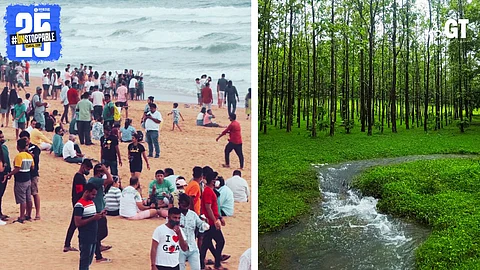

There is a continuing dream, one that began on the seashore and is steadily moving into the forests. The uninitiated call it the 'hinterland'. Basically, the dream is to make money all through the year. How, is not the concern.
Tourism is an industry with a life span or, as many in the business call, 'seasonal'. Before mining came to a halt, tourism was a way of life for many. It has changed, or attempts are being made to change it into what it should not be, a full-scale industry, and therein lies the concern.
Attempts to push tourism into the hinterland are not new. It's been tried before and hasn’t worked. Yet, the push continues, ignoring the fact that tourism follows its own rhythm and logic.
Today, taking tourists to the hinterlands simply entails going to the springs or water bodies which are enjoyed by the locals when they are in full force during the rains. Or it could mean they are taken on treks tailored for them in the interiors.
The tourists who have been coming during the monsoons are the lower-middle income tourists and just a few from the higher end, but what they seek to do is enjoy in the rains as they do during the season.
Drunken driving, accidents and locals being at the receiving end has become a trend these days. Fortunately, most of the calamities have not been serious, but dangerous enough to be noticed.
The tourists who have been coming during the monsoons are the lower-middle income tourists and just a few from the higher end, but what they seek to do is enjoy in the rains as they do during the season.
Goa has become a popular destination for reasons that often stray from its cultural roots. Extending tourism into the hinterland risks carrying these influences into ecologically and socially sensitive areas. Do we truly want to take this path?
Many budget tourists are drawn to Goa not just for affordable alcohol, but also by a misplaced sense of entitlement, often disregarding local norms and personal boundaries. Expanding tourism into the hinterland raises the concern of unwanted tourist behaviours. Is this truly the kind of tourism we wish to promote?
During the rains, the Goan hinterland is visited by locals who themselves forget to carry back their garbage. There are plenty of such instances. There are also times when tragedies have occurred at such places because the flow of the water is unpredictable at most water bodies.
With no life guards and no security checks, those interested in pushing tourism into the hinterland are actually trying to jump from the frying pan into the fire because apart from not being prepared, they do not know what they are doing.
With no life guards and no security checks, those interested in pushing tourism into the hinterland are actually trying to jump from the frying pan into the fire
In the past, the monsoon season was the time wherein those who worked hard during the season relaxed, rejuvenated and regrouped to give the tourists a warm welcome when the next season started.
The current push into the hinterland isn’t a fresh trend, it’s simply an extension of commercial overreach in a tourism sector that’s already under strain. High-end tourists rarely visit during the rains, as the season offers limited experiences.
Meanwhile, many domestic visitors are drawn by nightlife, easy access to substances, and a party culture that often overlooks the essence of responsible travel.
So, why not reconsider the plan before dragging Goa further into a space where there is only doom. When the season started heating up, it was the locally run beach shacks that were the first to shut shop, many out of choice, understanding the limits of the tourism cycle.
Meanwhile, those operated by outsiders clung on, often desperately, trying to recover the exorbitant rents they had paid, squeezing the last drop of profit from a fading season.
Will hinterland tourism, if pursued blindly, meet the same fate as the beach shacks? Time to sit and ponder.
Locals have already borne the brunt of unplanned tourism along the coast. Hinterland tourism will deepen the scars caused by beach tourism. Respecting the local way of life must be at the heart of any tourism plan. Without this, the industry could face long-term consequences.
It’s time to pause, reflect, and rethink our priorities. Perhaps we should put people before profit, and show that it is possible to dream differently and responsibly.